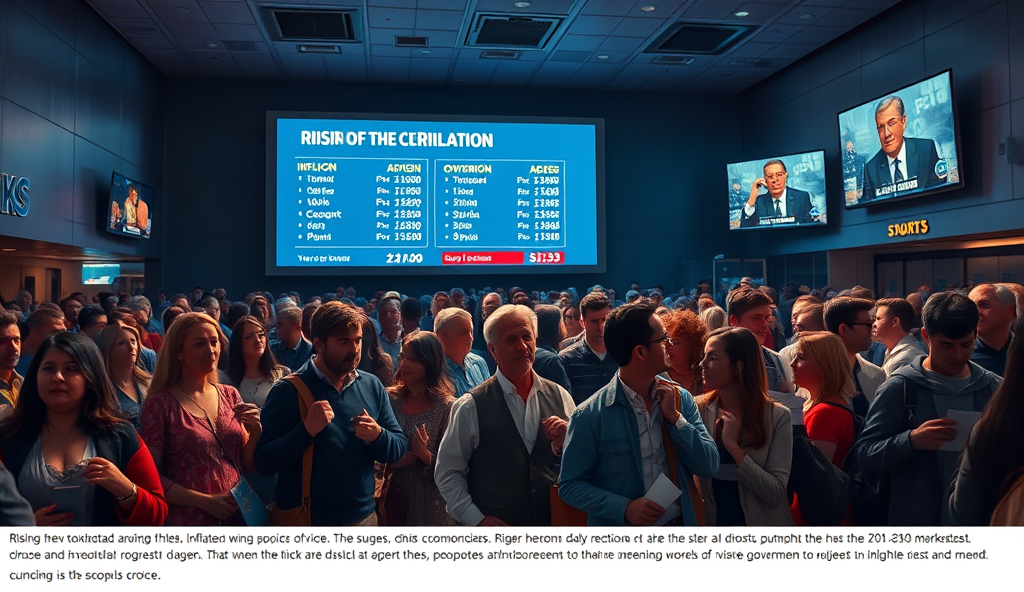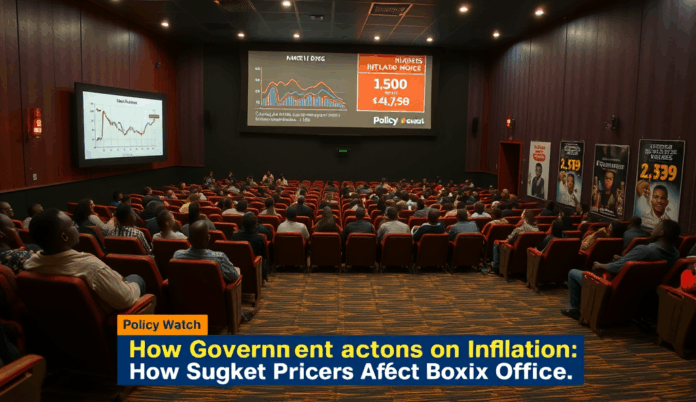Introduction to Inflation and Its Impact on Consumer Goods
Inflation in Nigeria, currently at 28.9% as of 2023, has significantly increased the cost of essential goods and services, directly affecting disposable income. This economic pressure forces consumers to prioritize necessities over leisure activities like cinema visits, reshaping spending patterns nationwide.
The rising cost of production inputs such as electricity and fuel has pushed up operational expenses for businesses, including movie theaters. For instance, cinema operators now face 40% higher overhead costs compared to pre-pandemic levels, inevitably leading to higher ticket prices.
As inflation persists, its ripple effects extend beyond basic commodities to entertainment budgets, setting the stage for examining its specific impact on Nollywood’s box office performance. This transition highlights how economic pressures influence consumer behavior in Nigeria’s film industry.
Key Statistics

Understanding the Nigerian Movie Industry (Nollywood)
Inflation in Nigeria currently at 28.9% as of 2023 has significantly increased the cost of essential goods and services directly affecting disposable income.
Nollywood, Nigeria’s vibrant film industry, produces over 2,500 movies annually, contributing significantly to the nation’s GDP and cultural identity. Despite its global recognition, the sector faces unique challenges, including the inflationary pressures discussed earlier, which directly impact production budgets and audience affordability.
The industry’s reliance on local talent and storytelling has fostered a loyal domestic audience, but rising costs threaten this connection. For instance, cinema operators now allocate 30% more of their revenue to cover operational expenses, squeezing profit margins and forcing tough pricing decisions.
As Nollywood navigates these economic headwinds, its resilience will depend on adapting to shifting consumer priorities. This context sets the stage for analyzing historical ticket price trends, revealing how inflation has reshaped accessibility to cinematic experiences in Nigeria.
Historical Trends of Movie Ticket Prices in Nigeria
Nigerian cinema ticket prices have surged by 150% since 2015 with premium screenings now costing ₦5000 compared to ₦2000 eight years ago outpacing general inflation rates.
Nigerian cinema ticket prices have surged by 150% since 2015, with premium screenings now costing ₦5,000 compared to ₦2,000 eight years ago, outpacing general inflation rates. This sharp increase reflects both rising operational costs and strategic pricing adjustments by theater chains struggling to maintain profitability amid economic pressures.
Data from Cinema Exhibitors Association of Nigeria shows ticket prices grew fastest between 2020-2023, correlating with Nigeria’s peak inflation periods that saw film production costs jump by 40%. Multiplexes like Filmhouse and Genesis have implemented dynamic pricing models, charging higher rates for prime-time weekend screenings while offering discounted weekday shows to balance attendance.
These pricing shifts have directly impacted audience demographics, with middle-class moviegoers reducing cinema visits from monthly to quarterly, according to a 2023 NOI Polls survey. This consumer behavior change sets the stage for examining how inflationary pressures cascade through Nollywood’s entire value chain, particularly production budgets.
How Inflation Affects Production Costs in Nollywood
The 40% surge in film production costs since 2020 mirrors Nigeria's inflationary trends forcing filmmakers to allocate larger budgets for location fees equipment rentals and crew wages.
The 40% surge in film production costs since 2020 mirrors Nigeria’s inflationary trends, forcing filmmakers to allocate larger budgets for location fees, equipment rentals, and crew wages. A 2023 Producers Guild report shows average Nollywood production budgets now exceed ₦50 million, up from ₦35 million pre-pandemic, squeezing profit margins despite higher ticket prices.
Key expenses like generator fuel and imported filming gear have become particularly volatile, with diesel costs alone consuming 15-20% of budgets compared to 8% in 2019. This cost-pressure cascade explains why mid-budget films like “Brotherhood” (2022) reportedly spent ₦12 million monthly on logistics, nearly double 2018 equivalents.
These inflated production realities directly influence theater pricing strategies, as distributors seek to recoup investments through higher ticket margins. This interplay between rising filmmaking costs and cinema economics sets the stage for examining inflation’s direct impact on ticket pricing structures.
The Direct Impact of Inflation on Movie Ticket Prices
Nigerian moviegoers are increasingly selective with Cinema Exhibitors Association data showing a 22% drop in weekday attendance since 2022 as ₦3500 tickets strain budgets.
Nigerian cinemas have raised ticket prices by 35-50% since 2020, with Filmhouse Cinemas reporting average tickets now cost ₦3,500 compared to ₦2,300 pre-pandemic, directly tracking the naira’s depreciation and rising operational costs. This aligns with the earlier discussed production cost surges, as theaters pass on increased film licensing fees and energy expenses to consumers.
Data from the Cinema Exhibitors Association shows Lagos theaters now allocate 60% of ticket revenue to cover overheads like diesel and staff salaries, up from 40% in 2019, forcing price hikes even for local productions. Blockbusters like “Battle on Buka Street” (2022) saw premium screenings hit ₦5,000, reflecting how inflation reshapes tiered pricing strategies across Nigerian cinema chains.
These inflationary pressures create a ripple effect, where higher ticket prices risk reducing footfall—a challenge we’ll explore next in consumer behavior patterns. The box office faces a delicate balance between sustaining operations and retaining audiences amid Nigeria’s economic realities.
Consumer Behavior: How Nigerians React to Rising Ticket Prices
The Nigerian government has introduced tax rebates for cinema operators reducing operational costs by 15% in 2023 under the Creative Industry Financing Initiative.
Nigerian moviegoers are increasingly selective, with Cinema Exhibitors Association data showing a 22% drop in weekday attendance since 2022 as ₦3,500 tickets strain budgets, though weekend crowds remain stable for major releases. Families now prioritize discounted matinees or bundle deals, with Filmhouse reporting 40% higher demand for early-bird promotions compared to standard screenings.
Premium pricing for films like “Battle on Buka Street” has created a two-tier audience, where affluent viewers sustain high-end screenings while middle-class patrons wait for streaming. A NOIPolls survey revealed 68% of Lagosians now watch only 1-2 films annually in cinemas, down from 3-4 pre-pandemic, signaling inflation’s impact on leisure spending habits.
This shift sets the stage for analyzing historical price trends, as exhibitors experiment with dynamic pricing to balance revenue and accessibility. Next, we’ll compare pre- and post-inflation ticket structures to quantify how economic pressures reshape cinema economics.
Comparison of Movie Ticket Prices Before and During Inflation Periods
Pre-inflation, Nigerian cinemas maintained stable pricing, with standard tickets averaging ₦2,000-₦2,500 in 2020, allowing middle-class families to attend 3-4 times annually. By 2023, inflation pushed average tickets to ₦3,500-₦4,000, with premium releases like “Battle on Buka Street” reaching ₦6,000, creating the two-tier audience dynamic mentioned earlier.
Filmhouse Cinemas’ financial reports show a 55% year-on-year increase in operational costs since 2021, forcing exhibitors to transfer 40% of these expenses to consumers through higher ticket prices. This aligns with NOIPolls data showing 72% of respondents now consider cinema visits a luxury, compared to 48% pre-pandemic.
The inflationary spike has reshaped pricing models, with weekday discounts dropping to ₦2,800 from ₦1,500 in 2020, while weekend premiums rose by 85%. These shifts set the stage for examining how cinemas are adapting their strategies to retain audiences amid economic pressures.
Strategies by Cinema Owners to Mitigate Inflation Effects
Facing rising operational costs and declining attendance, Nigerian cinemas have adopted tiered pricing, offering discounted weekday rates (₦2,800) and loyalty programs to retain budget-conscious viewers while maintaining premium weekend pricing. Filmhouse Cinemas reported a 30% increase in weekday foot traffic after introducing “Family Tuesdays,” bundling tickets with concessions at ₦5,000 for four persons.
To offset inflation-driven challenges, operators are diversifying revenue streams through partnerships with brands like MTN and Pepsi, accounting for 25% of ancillary income in 2023 according to industry reports. Silverbird Cinemas also introduced dynamic pricing for Nollywood premieres, adjusting rates based on demand—a strategy that boosted “Battle on Buka Street” revenue by 18%.
These adaptations highlight exhibitors’ balancing act between affordability and sustainability, setting the stage for government interventions to stabilize prices.
Government Policies and Their Role in Stabilizing Prices
The Nigerian government has introduced tax rebates for cinema operators, reducing operational costs by 15% in 2023 under the Creative Industry Financing Initiative, according to the Central Bank of Nigeria. These measures aim to counterbalance inflation-driven price hikes while supporting exhibitors’ revenue diversification efforts, including partnerships with brands like MTN and Pepsi mentioned earlier.
State governments are also implementing localized interventions, such as Lagos’ 10% entertainment levy waiver for cinemas screening indigenous films, directly addressing Nollywood box office performance during inflation. Such policies complement exhibitors’ tiered pricing strategies, creating a more sustainable ecosystem for both operators and moviegoers.
With these interventions showing early promise, attention now shifts to whether they can sustainably curb rising ticket prices or if further economic pressures will dictate future costs. This sets the stage for examining long-term projections in the next section.
Future Projections: Will Movie Tickets Become More Expensive?
While government interventions like tax rebates and levy waivers have temporarily stabilized prices, sustained inflation at 28.9% (Q1 2024) may force cinemas to adjust ticket costs further. Industry analysts project a 5-8% annual price increase if inflation persists, though tiered pricing and corporate partnerships could mitigate the impact on budget-conscious moviegoers.
The success of Lagos’ indigenous film incentives suggests localized policies may play a bigger role in keeping Nollywood screenings affordable compared to foreign blockbusters. However, rising operational costs—from electricity tariffs to imported projection equipment—remain wild cards that could outweigh current relief measures.
Ultimately, ticket prices will hinge on whether Nigeria’s broader economic reforms gain traction or if cinemas must pass more costs to consumers. This delicate balance between affordability and sustainability leads us to examine final takeaways in the conclusion.
Conclusion: Balancing Inflation and Affordable Entertainment
As Nigeria’s inflation continues to reshape consumer spending, the film industry faces the delicate task of maintaining accessibility while covering rising operational costs. Cinema chains like Filmhouse and Genesis have introduced loyalty programs and off-peak discounts to cushion the impact of rising ticket prices on moviegoers.
Data from the Cinema Exhibitors Association of Nigeria (CEAN) shows a 15% drop in attendance since 2022, highlighting how inflation affects movie attendance in Nigeria. However, innovative approaches like bundled snack deals and weekday promotions help retain audiences despite economic pressures.
Looking ahead, stakeholders must collaborate on sustainable solutions, from government tax relief for cinemas to flexible pricing models. This balance will determine whether Nollywood’s box office performance during inflation remains resilient or suffers long-term decline.
Frequently Asked Questions
How can I still enjoy movies at the cinema despite rising ticket prices?
Look for weekday discounts like Filmhouse's 'Family Tuesdays' offering bundled tickets at ₦5,000 for four persons or attend early-bird matinee screenings.
What government policies are helping to keep movie tickets affordable?
The Creative Industry Financing Initiative offers 15% tax rebates to cinemas while Lagos provides 10% levy waivers for theaters screening Nollywood films.
Will Nollywood movie ticket prices continue to increase in 2024?
Analysts project 5-8% annual increases if inflation persists but loyalty programs and corporate partnerships may help stabilize costs.
How has inflation changed how often Nigerians visit cinemas?
NOIPolls shows 68% of Lagosians now watch only 1-2 films annually in cinemas compared to 3-4 pre-pandemic – consider prioritizing must-see premieres.
What strategies are cinemas using to offset inflation costs without raising prices?
Theaters are diversifying revenue through brand partnerships (like MTN/Pepsi deals) which accounted for 25% of 2023 ancillary income according to industry reports.


